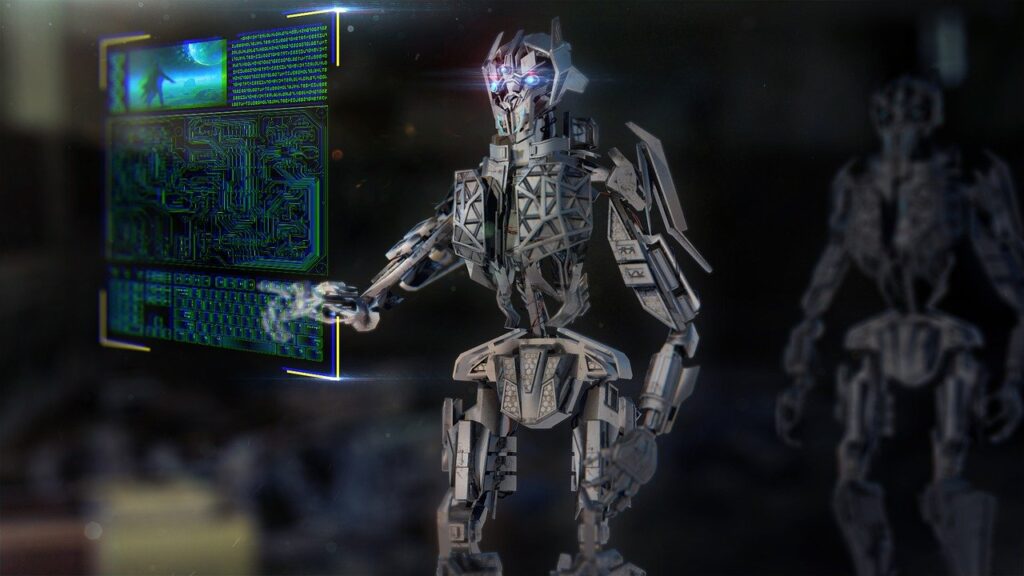
What is robotics?
Robotics is the science that studies the technologies associated with designing and building robots. Robots are automatic mechanisms that use integrated circuits to carry out simple or complex human activities and movements. Robotics has wide application in several areas from industrial production, medicine to domestic activities.
The concept of robotics emerged in the early 20th century, in the work “The Liar” by science fiction author Isaac Asimov,
It was the author who created the word ‘robotics’ and he was also the one who introduced, in the field of science fiction, the Laws of Robotics.
The term was only popularized in 1950 on account of the book “Eu, Robot”, by the same author. The work raised several discussions about the relationship between men and machines.
The idea of creating machines is old. In Ancient Greece, it was believed that the Greeks and Romans already developed different types of machines capable of performing automated movements.
The 2021 edition of the “First Lego League” robotics tournament is starting and this year this year’s season theme is “Replay” and the general theme is a sedentary lifestyle in children and teenagers and the tournament aims to encourage scientific exploration.
Since 2013, the Social Service for Industry (SESI) is the official organizer of the FIRST Lego League Robotics Tournament.
Each season, students from 9 to 16 years old, from public and private schools, are challenged to present innovative solutions for certain themes.
In the 2020/2021 season, the RePLAY challenge challenges young people to rethink spaces for exercises, competitions, and games with a focus on current reality and with an eye on the future. For this, they apply STEM concepts in creating innovation projects, build and program robots, and put them to complete missions where the ultimate goal is to have fun!
During the competition, each team must present a project with an innovative solution for the theme, in addition to planning, designing, and building robots with Lego pieces.
What is a robot?
Robots are automatic mechanisms that perform work and human movements. They are controlled by humans and provided with electronic systems.
The word robot first appeared in a theater, in the play “Robots Teatrais de Rossum”, by Czech Karel Capek. That was 100 years ago, but even back then, the robot was a symbol of technological development and greatness.
Currently, most existing robots are in the industry. Nearly 254,000 of them were purchased by industry around the world in 2015 alone, according to the International Robotics Federation (IFR).
What is robotics for?
Robotics has wide application in several areas from industrial production to domestic activities. Since the First Industrial Revolution, robots and other equipment have been used to increase the productivity of companies.
But contrary to popular belief, robotics does not exist only for the use of large companies.
Everyday tasks like cleaning the house, for example, have become less exhausting with the help of new technologies and devices that perform automated activities.
The network of schools of the Social Service for Industry (SESI) offer in their methodology the study of robotics as part of their curriculum and are present in around 400 schools.
The National Service for Industrial Learning (SENAI) already offers courses in robotics and programming, with an eye on the so-called professions of the future, which had their demand for qualified professionals accelerated due to the pandemic and the increase in remote work.
What do you study in robotics?
Robotics at school have transformative power. Children and young people who previously were not very interested in studying subjects such as Mathematics, Science, Physics, or even Portuguese, start to dedicate themselves diligently to be able to program and design robots.
In a short time, there is a clear improvement in performance in all subjects and a greater interest in areas related to technology.
Since 2006, SESI has included the discipline in the curriculum of its schools throughout Brazil. Every year, thousands of elementary and high school students develop fundamental skills for professional 4.0: teamwork, logical reasoning, and a critical view of the world.
Future professional: Educational robotics encourages fundamental skills for professional 4.0 such as investigative spirit, teamwork, planning, cooperation, dialogue, research, and decision-making. With a focus on Science, Technology, Engineering, Arts, and Mathematics, robotics is fostering new generations of engineers and researchers that the industry so desperately needs.
Creativity and innovation: Robotics goes far beyond robot programming. It’s mainly a learning process. The objective is to encourage young people to think in a creative, efficient, playful, and practical way to solve the problems generated by what was studied in the classroom.
Socio-emotional skills: The job market requires much more than technical skills. Socio-emotional skills make professionals stand out, and students who learn while still in school to acquire these skills become professionals who are better prepared for the challenges of building a career.
Classroom performance: A survey by FIRST (For Inspiration & Recognition of Science & Technology), a non-governmental organization responsible for the robotics world championship, shows that 88% of robotics competition participants said they had increased interest in going to the school and 80% responded that they became interested in working in areas related to science and technology after participating in robotics disputes.
Entrepreneurship: To be a good entrepreneur, it is necessary to plan, act with goals, optimize the budget, know how to work in a team and, of course, “sell” your ideas very well. These skills are part of the routine of educational robotics students.
Opportunities abroad: Whoever makes robotics is accredited to participate in tournaments promoted in Brazil. Students from public and private schools or even garage teams (without schooling) can compete. A good placement on the national stage can guarantee a place for international competitions.
Guaranteed fun: One of the premises of robotics is that learning goes hand in hand with fun, so children and teenagers learn by playing, which increases engagement and brings great acceptance from students.






